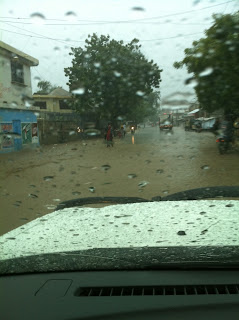
If you don't follow the PH-H update you might want to go to our website at www.projecthelp-haiti.org. In my last update I wrote about our new group of missionaries that we have working at Project Help. It seemed for a period of time it was hard to find and keep missionaries on the missions field at least from our denominational perspective in Haiti. In my 12 years now on the missions field I have seen a steady turn around in interest in missions as a viable career option again. In fact next year we will have 12 nearly full time missionaries working in Haiti and 2-3 part time. Since 2002 we struggled to keep 4 people in Haiti and at times it often was Dr.Vic & Donna Binkley who came every other month as our sole missionaries. This past year I have had more people who were qualified and had abilities I could have used than I had available positions. I have some thoughts on why the turn around. It all starts with EXPOSURE!
1. "Exposure from the pulpit".
2. "Exposure from media sources".
3. "Exposure to worldwide communications".
4. "First hand exposure". ( STM'S )
5. "All out exposure" Church willingness to commit God's resources to the task they were given.
Our denomination has had a long history of working in missions. One hundred plus years in India, fifty in Bangladesh, forty four in Haiti and twenty five plus years in Brazil. We also have missionaries in Venezuela, Kenya, Sweden, Dominican Republic, Thailand and on the Southwest Four Corners Indian reservations. Many of our early missionaries stayed on the missions field for a lifetime. These men and women who grew up in the 1930s-40s were inspired by visiting missionaries who would come and speak at their churches while home on furlough. Often it was that onetime connection that planted the seed in their mind to go to the mission field when they grew up. This was a time when churches, schools, family and small close knit communities were the influencing factors of growing up. Our heroes and heroines were people we encountered or knew who influenced us in real life situations. There was a time when parents, grandparents teachers, coaches, pastors, writers and public speakers were the main influence in a child's life. These missionaries though far and few apart usually stayed a lifetime.
I've attended church from as far back as I can remember and can't recollect ever hearing a missionary speak or visit any of the churches I attended growing up or thereafter. In fact it was 1997 when we started attending First Church of God in Columbia City that I started hearing missions as a prominent message theme, Pastor Reser was a former Haiti missionary. Granted I may not have always been attentive as a youth but I'm sure a missionary from some exotic foreign missions outreach would have gotten my attention. In fact the most memorable part of my Colonial African history course in college was reading about Dr. Livingston.
I still attend FCOG Columbia City and our Pastor is now Johnny MacCalister's. His messages revolve almost every Sunday around a call to get up out of the pew and outside of the Church walls doing mission service whether local, regional, national or to the "ends of the earth". It is encouraging to see that pastors are finally getting the word out that The Great Commission "is not an option but a Command"
I think another thing that has dramatically helped with recruiting is the number of books that are now available to read about missions. The themes vary from mission history, trends, fund raising to personal and locational stories and biographies. Books of course have always been available but the internet has made finding, researching and purchasing light years away from where it was 12 years ago.
The internet and instant communications is quite possible the single biggest advance in technology in every aspect of our lifetime. I can now communicate around the world from Haiti whereas 12 years ago we still depended on "snail mail". The ease and speed of the internet allows us to keep our supporters and others with interest informed with E-mail, Blogs, Facebook, Twitter, Texting, electronic newsletters, pictures and videos.
People who are feeling the call to go to the mission field now days have the option of getting on " Short Term Mission teams". All of our present 12 plus missionaries in Haiti including myself started out on a STM.
The last of our 'Five Exposure Points" is that of "all out exposure", this is the one I have the most involvement with and spend the most time evaluating and studying. My boss who is director of Cross Cultural Ministries is doing his doctoral thesis on mission minded churches. This summer when we were in Haiti together I posed this question to him. "Is it the mission minded church which makes the well organized, strong and productive mission organization or is it the the well organized, strong and productive mission that creates the mission minded church"? We agreed that it is both, in fact they attract each other. It is not just the big churches nor the big mission organizations either. I have seen many very small churches and mission organizations who are doing more with what God has given and entrusted to them than the medium, big and mega churches and missions. It is exciting to me to see how a church can grow and expand once it lays it all on the alter and commits to the work at hand, that church may not always grow significantly in size but for sure in FAITH.















